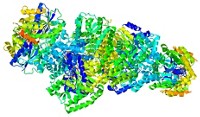Advertisement
Grab your lab coat. Let's get started
Welcome!
Welcome!
Create an account below to get 6 C&EN articles per month, receive newsletters and more - all free.
It seems this is your first time logging in online. Please enter the following information to continue.
As an ACS member you automatically get access to this site. All we need is few more details to create your reading experience.
Not you? Sign in with a different account.
Not you? Sign in with a different account.
ERROR 1
ERROR 1
ERROR 2
ERROR 2
ERROR 2
ERROR 2
ERROR 2
Password and Confirm password must match.
If you have an ACS member number, please enter it here so we can link this account to your membership. (optional)
ERROR 2
ACS values your privacy. By submitting your information, you are gaining access to C&EN and subscribing to our weekly newsletter. We use the information you provide to make your reading experience better, and we will never sell your data to third party members.
Environment
Sustainable Microbial Hydrogen Production
November 26, 2007
| A version of this story appeared in
Volume 85, Issue 48

Hydrogen-powered transportation may reduce environmental emissions, but most H2 is currently generated from nonrenewable fossil fuels, such as natural gas. To address this conundrum, Shaoan Cheng and Bruce E. Logan at Pennsylvania State University, University Park, have devised an efficient method for directly producing H2 from any type of biomass in a modified microbial fuel cell (Proc. Natl. Acad. Sci. USA 2007, 104, 18871). Inside the fuel cell, bacteria grown from soil and wastewater feed on cellulose, glucose, and the acid by-products of fermentation, such as acetic and butyric acids. Applying a small voltage (0.2–0.8 V) to the circuit converts the protons and electrons released by the bacteria into H2 at the cathode. The fuel cell produced H2 in good yields with an overall energy efficiency of up to 82%. The researchers suggest that the applied voltage also could come from renewable sources. And even if an H2-based transportation system never develops, they say their method could make other processes that use H2, such as fertilizer production, less dependent on fossil fuels.




Join the conversation
Contact the reporter
Submit a Letter to the Editor for publication
Engage with us on Twitter